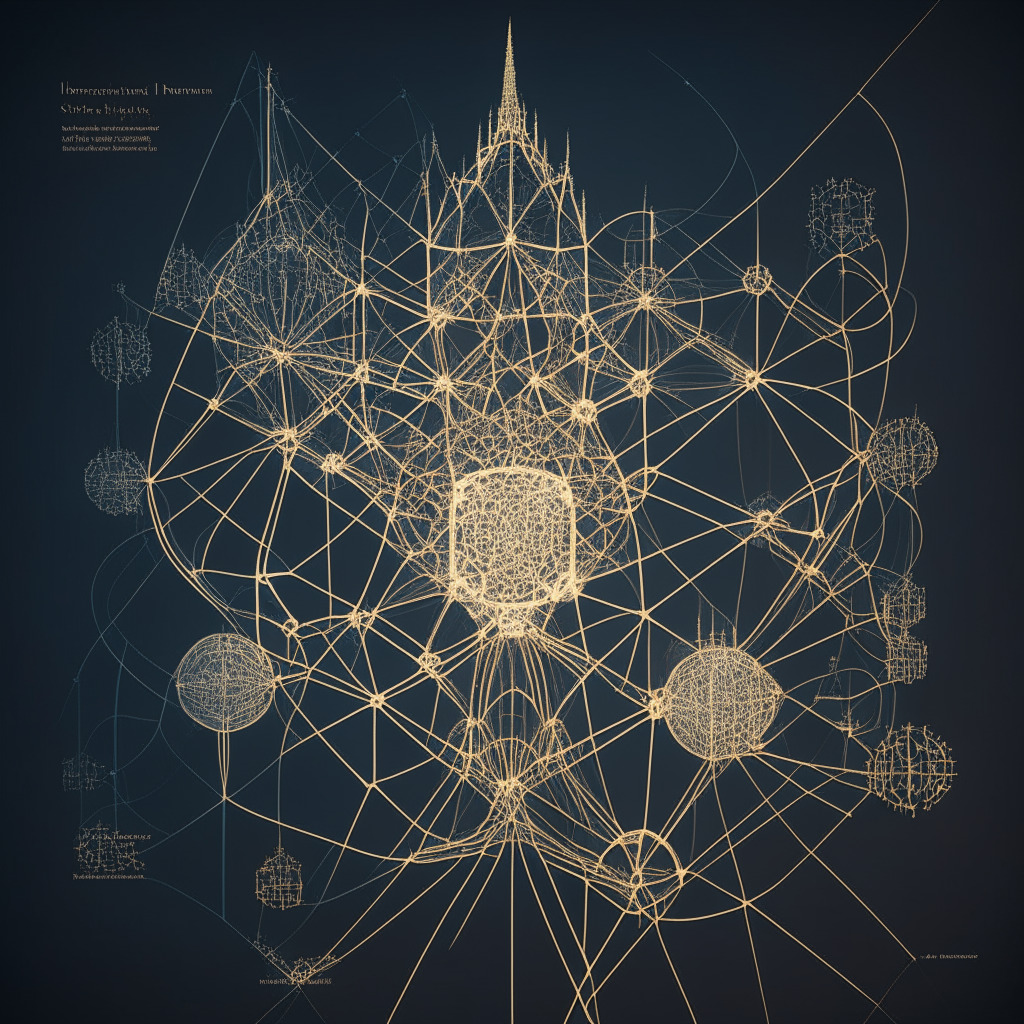Russian firms are adopting the central bank digital currency (CBDC), the digital ruble. Sirius Innovation Science and Technology Center and Rostelecom are pioneering this journey with their digital wallets, highlighting the practical application of this currency. However, this new model poses challenges for traditional financial institutions, and concerns remain about security and potential economic disruption.
Category: Technology
Introducing DRAM: Dirham-Backed Stablecoin Aims for Global Impact Amidst Regional Restrictions
Swiss company DTR presents a Dirham-supported stablecoin, DRAM, aiming to facilitate global value transfer. Despite its non-availability in UAE and Hong Kong, the token, developed by Dram Trust is listed on decentralized exchanges like Uniswap, PancakeSwap trading with Binance Coin.
AI-Powered Analytics Venture yPredict: A Promising Contender or Just Another Crypto-Flash?
yPredict, a rising contender in cryptocurrency and blockchain technology, offers AI-powered analytics solutions via its utility token, YPRED. It’s aiming to integrate AI with cryptocurrency, a blossoming sector, and provide tools like AI-assisted content generation and trading signals. However, its challenge to secure a substantial market share in a crowded space remains.
Navigating the Cosmos: The Pros and Cons of Bitcoin Integration Through nBTC Interchain Upgrade
Developers are integrating Bitcoin into the Cosmos network via Osmosis, a prominent decentralized exchange (DEX). The result is Nomic Bitcoin (nBTC), an IBC-compatible token that expands Bitcoin’s use across over 50 Cosmos-linked app chains. Despite transaction fees, crypto-investors can self-custody nBTC, use it as collateral, and engage in lending within the ecosystem. However, the initial cross-chain bridge limit could frustrate high-volume investors.
Unraveling the Paradox of Increased Decentralization: The Optimism Network’s Stride and Binance’s Unexpected Move
The Optimism network has launched its testnet version of a fault-proof system aimed at increasing the efficiency and decentralization of the Superchain. Typically reliant on centralized sequencers, the new system offers modular options to prevent fraud. However, co-founder of Ethereum, Vitalik Buterin, asserts the importance of user-submitted fraud proofs to maintain true decentralization.
Unlocking the Future of AAA Gaming: The Role of DApps and the Actor Model in Blockchain Technology
“While blockchain technology creates innovative opportunities in gaming with decentralized applications (DApps), it faces challenges in complexity, scalability, and performance. However, the ‘actor model’- a communication model that facilitates parallel computing and asynchronous messaging within a blockchain protocol, promises improved development efficiency, better throughput, resilience against network conditions, and efficient event-driven architectures. This model might enable developers to create powerful AAA-grade DApps, balancing immersive experiences with user-friendly expenses.”
Navigating NFTs: How Musician Vérité Blends Blockchain Innovation with Fan Loyalty
Independent musician Vérité leverages NFTs and Web3 to build a fan-centric community, fractionate song royalties via blockchain, and add value to concert experiences. However, she emphasizes caution, respectful interaction, and not solely depending on these digital tools due to their inherent risks and potential non-sustainability.
Unfolding the DRAM Narrative: A Dirham-Backed Stablecoin Amid Regulatory Challenges
“Distributed Technologies Research has developed DRAM, a Dirham-backed stablecoin listed on DeFi protocols Uniswap and PancakeSwap. The stablecoin aims to bring stability to countries with high inflation, linked to UAE’s native currency performance. However, regulatory limitations present challenges to its acceptance and growth.”
Shaping AI Future: Samsung, Tenstorrent Alliance, and the Global Politics Surrounding AI Chips
Samsung partners with Canadian startup Tenstorrent to develop AI chips, using advanced Samsung manufacturing processes. This innovation, fuelled by a successful funding round, has the potential to create high-performance computing solutions for global customers. However, challenges remain in a fluctuating AI chip market and evolving geopolitical dynamics.
Navigating the Metaverse Decline: Lamina1’s Defiant Journey Amidst AI Deepfake Controversies
Despite decreased interest in the metaverse, Neal Stephenson’s Blockchain project, Lamina1, continues its vision, organizing events to encourage metaverse-driven experiences. CEO Rebecca Barkin expresses optimism, noting the continued investment in digital experiences, gaming, and new technological explorations.
Navigating the Future of Payments: Visa’s $100M AI Venture & Crypto Integration
“Visa plans to invest $100 million in generative AI ventures, a technology that can generate various content forms and add dynamism to the industry. The firm’s AI-based solutions have been effective in fraud prevention, highlighting AI’s critical role in enhancing payment systems. However, successful AI implementation requires a robust regulatory framework.”
AI Revolution in Finance: Unparalleled Efficiency or a Trojan Horse?
Jamie Dimon, CEO of JPMorgan, highlights the vast potential of AI in streamlining banking processes including trading, hedging and research. However, he also acknowledges potential risks, such as job displacement and misuse of AI, particularly in cybercrime.
Balancing Privacy and Legality: Unraveling the Paradox of Cryptocurrencies through the Lens of JW Verret
Blockchain advocate JW Verret perceives ZCash, a privacy-centred cryptocurrency, as a remarkable innovation set to revolutionize daily payments. However, he acknowledges that despite their potential to surpass traditional monetary systems, cryptocurrencies can be exploited for illegal activities. His work sparks discussions around privacy, legality, and the need for better tracing regulation in the cryptocurrency realm.
UBS Asset Management Takes Leap with Blockchain: Tokenized VCC Fund on Ethereum Unveiled
Switzerland’s UBS bank is making strides in the blockchain industry, launching its first ever pilot tokenizing a fund on the Ethereum blockchain. This initiative, a component of Project Guardian, aims to tokenize real-world assets and widen market accessibility for investors. UBS’s revolutionary tokenized service promises to shape the digital asset space and potential future adoption of blockchain technology.
Zuckerberg’s Bet on AI for Meta’s Metaverse Dominance: Visionary Leap or Blind Hope?
Meta’s CEO, Mark Zuckerberg, highlighted the crucial role of AI in the development of the metaverse during a recent interview. By leveraging technology that integrates VR/AR and AI, Zuckerberg aims to establish Meta’s dominance in the 3D immersive metaverse. Despite financial setbacks, he remains committed to the metaverse vision, betting on Llama 2’s technology integration with Meta AI as their unique competitive edge.
Exploring the Pitfalls of Deletion in Large Language Models: A Daunting Quest in AI Security
“A recent study by the University of North Carolina reveals that Large Language Models (LLMs), such as OpenAI’s ChatGPT and Google’s Bard, may unintentionally retain and regurgitate sensitive data, despite apparent deletion. Attempts to fully purge such information have been largely unsuccessful, presenting challenges in AI and data security.”
Navigating the Dynamic World of Blockchain: Turbulent Tides of Transparency, Legality and Longevity
“UBS Asset Management has initiated a ‘smart contract’ pilot on the Ethereum blockchain, focusing on tokenisation services, including the first live pilot of a tokenized Variable Capital Company fund. Meanwhile, FTX founder’s alleged dismissal of $8 billion in missing funds as a ’rounding error’ sparks concern about fund oversight.”
Unleashing AI and Blockchain’s Potential in Gaming: New Dimensions or Risky Bet?
“Ryan Wyatt, former gaming head at Google and YouTube, outlines AI’s role in the gaming industry. While not a replacement for tasks, AI will aid game teams to accomplish more. Wyatt sees blockchain’s potential in game development and its necessity in holding accountability over AI advancement due to its transparent, reliable nature.”
Understanding the Steady Surge and Potential Challenges in Blockchain Mining and Tokenization
“In the evolving world of blockchain, Bitfarms, a leading Bitcoin miner, intensified its mining operations in September, producing over 400 bitcoins. However, the company’s mining rate decreased compared to the previous year, illustrating a challenging mining environment. Meanwhile, UBS bank launched a pilot of a tokenized fund, emphasizing further advancements in blockchain and cryptocurrency space.”
Ethereum’s Real-World Ascent: UBS Tokenization and What It Means for Blockchain Future
“UBS bank launches a live pilot of a tokenized money market fund on Ethereum, aiming to democratize market liquidity. The project brings together traditional financial institutions and fintech providers. However, tokenization faces challenges such as asset valuation transparency and blockchain complexity.”
Decentralized Social Network Friend.tech Surpasses Protocol Fees by ETH 11,000: A High Risk Success
Friend.tech, a decentralized social network built on Coinbase’s Base and linked to Twitter, is gaining traction with almost ETH 11,000 in protocol fees. It currently ranks third in 24-hour fees, surpassing established platforms like OpenSea, Tron, and layer-1 & layer-2 giants such as Uniswap, Bitcoin, and MetaMask.
Exploring Tokenization: The Future of Asset Management or a Risky Venture?
“Tokenization, the process of translating ownership rights of assets into digital tokens on a blockchain, is revolutionizing traditional finance by streamlining payment mechanisms, creating programmable smart contracts, and ensuring secure, transparent ledgers. This conversion into non-fungible tokens (NFTs) promises simplified, optimized payments for artists, content creators, and sports personalities.”
Ethereum Staking Shake-up: Buterin’s Insight and the Decentralization Dilemma
“Ethereum’s co-founder, Vitalik Buterin, discussed potential changes to Ethereum’s staking system, assessing a range of protocols and expressing concerns about the centralization of power among staking providers. He proposed mechanisms to enhance safety and decentralization of liquid staking and recommended revising certain procedures.”
Brazil’s Blockchain Revolution: Tokenizing National Identity with Cause and Concern
Brazil is planning to tokenize the identities of over 214 million citizens through digital documents, using blockchain technology. This initiative, aiming for complete coverage by November 6, promises enhanced security against fraud and improved inter-government collaboration and service accessibility.
Rosbank’s Bold Endeavor: Embracing Digital Ruble Amidst Security Concerns and High Costs
“Rosbank, a trailblazer in the digital currency revolution, invested $1.6 million on integrating its systems with the digital ruble merely two months into the CBDC pilot. Emphasizing on secure transactional gateways, engaging complex cryptography solutions, and investing in specialized expertise, Rosbank stands resolved to overcome challenges of safety concerns, technological hurdles, and costly investments in this digital financial infrastructure.”
Harnessing the Power of Tokenization: Future of Asset Management and The Uncertainties Ahead
“Tokenization, referring to the conversion of asset ownership rights into digital tokens on a blockchain, is revolutionizing securitization according to Jenny Johnson, CEO of Franklin Templeton. It opens up new possibilities for alternative investment vehicles with its incorporation of a payment mechanism, programmable smart contracts, and a source of truth embedded in a decentralized ledger.”
Microsoft’s Nuclear-AI Venture: A Leverage or a Risk? Unpacking Crypto’s Latest Developments
Microsoft is recruiting a program manager for their nuclear technology initiatives, as part of their plan to harness AI and nuclear energy together. This move, while offering efficient energy consumption, brings up concerns due to its controversial and risky nature.
Demystifying Crypto Synthetic Assets: Unmasking the Potential and Pitfalls
“Crypto synthetic assets are digital financial instruments that replicate the value of real-world assets. They are superior in terms of accessibility, liquidity, and programmability but come with unique risks. Types include synthetic stablecoins, tokenized commodities and equities, and yield-bearing assets in the DeFi ecosystem.”
Ethereum Co-founder’s Warning: DAOs and Vulnerabilities in Staking Pools
In his recent blog post, Ethereum co-founder Vitalik Buterin expressed concerns over Decentralized Autonomous Organizations (DAOs) dominating liquid staking pools, potentially opening doors to network vulnerabilities. He emphasizes the importance of engaging with various liquid staking providers to mitigate systemic risks.
Blockchain Revolution in Brazil: National ID & the Prospects and Predicaments of Drex
Brazil plans to incorporate a blockchain-based system for identity verification across three states, with potential to combat crime, streamline services, and protect individual data. However, concerns remain regarding the balance of enhanced security and potential misuse risks.
AI Market Saturation: An Ideal Breeding Ground for Innovation or an Overheating Bubble?
“The AI era differs fundamentally from its predecessors, displaying practicality and capacity to enhance multiple industries. Despite high valuations and growth, concern surrounds possible AI market overheating. Contrasting views argue market saturation serves as a birthplace for future innovations, thus ensuring industry advancement.”
Leased Proof-of-Stake: Game-Changer or Just Another Player in Blockchain Technology?
“Blockchain technology introduces Leased Proof-of-Stake (LPoS), an innovative mechanism aimed at overcoming crypto mining complications. LPoS allows tokenholders to lease their tokens to validator nodes, improving their chance at generating new blocks and sharing transaction fees. While offering benefits such as decentralization and fixed tokens, LPoS also maintains control by restricting trade or transfer of leased tokens.”































